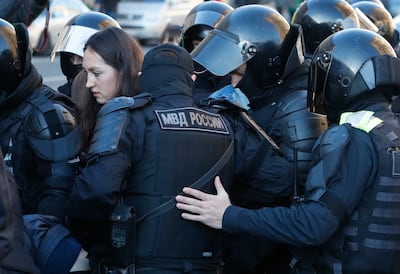Demonstrations have taken place across Russia by protesters angry at President Vladimir Putin’s military plan to mobilise 300,000 fighters for the war in Ukraine.
Russian police moved quickly to break up the rallies on Saturday and more than 730 people, including 300 in Moscow and about 150 in St Petersburg, were reportedly detained.
Protests against the country’s first compulsory military draft since the Second World War took place in 32 cities, rights group OVD-Info said.
Mr Putin’s speech on Wednesday, announcing the “partial mobilisation” of 300,000 additional men, came as a surprise to many in Russia.
The rallies on Saturday came as Russia signed into law new anti-desertion measures and neighbouring countries confirmed queues of people trying to leave Russia.
New sentencing toughens the penalties for desertion, refusal to fight and voluntary surrender, with up to 10 years in prison.

A separate law, also signed on Saturday, gives the possibility of Russian citizenship for foreigners who enlist in the Russian army.
Some men fearing conscription have been fleeing the country by plane or car, while others have gone to ground to hide from potential draft notices.
Countries bordering Russia, from Finland to Kazakhstan, reported increased vehicle traffic. Airline tickets are fully sold out for days at record prices.

Russian authorities admitted there was a “significant” influx of cars trying to cross from Russia into Georgia on Saturday.
“There is a significant congestion of private vehicles … around 2,300" waiting to pass one checkpoint along the border, said the local interior ministry in a Russian region that borders Georgia. The ministry urged people “to refrain from travelling” in the direction of Georgia.
More than 1,300 protesters were arrested during a previous wave of protests on Wednesday.
Unsanctioned rallies are illegal under Russian law, which also forbids any activity considered to defame the armed forces.
Defence Minister Sergei Shoigu said the mobilisation order applies to reservists who had recently served or had special skills.
But almost every man is considered a reservist until age 65, and Mr Putin’s decree has kept the door open for a broader call-up.
Moving to assuage public fears over the call-up that could erode the president’s grip on power, authorities announced that many Russians working in high tech, communications or finance would be exempt.
One sign that the government has worries about the mobilisation backlash is public criticism from the head of a top state-controlled TV station.
Margarita Simonyan criticised military authorities for sweeping up random people to meet mobilisation targets instead of calling up people with specific skills and recent military service, as promised.
The RT chief said military conscription offices were “driving people mad” by rounding up those who weren’t supposed to be drafted. “It’s as if they were tasked by Kyiv to do that,” she said.

